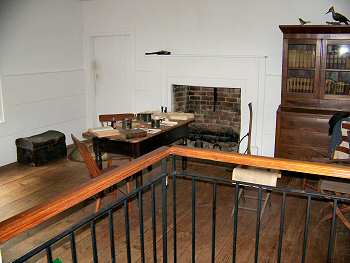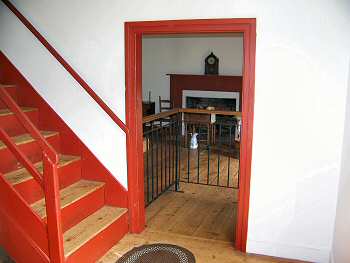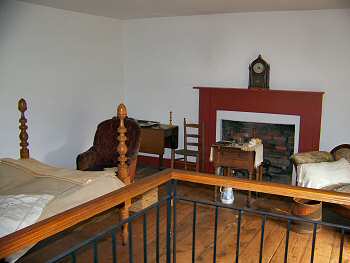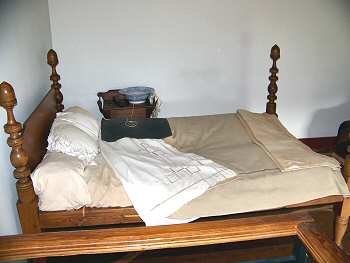|
(July 2018)
Enlarge Waiting
Room
Jackson's doctors and staff officers both worked and relaxed in this room
during the general's stay. Five different physicians examined Jackson, and
these men probably discussed their conclusions here over cups of coffee.
Chief among the surgeons was Dr. Hunter McGuire. McGuire had amputated
Jackson's wounded left arm at a field hospital near Chancellorsville early
on May 3. Jackson's chaplain, Beverley Tucker Lacy, then buried the
useless limb at Ellwood, a nearby plantation. Lacy comforted the pious
Jackson, holding devotions with him daily at Chandler's office. Lacy kept
General Lee apprized of the wounded man's condition. At one point, in
speaking of Jackson, Lee told Lacy: He has lost his left arm, but I have
lost my right arm."
Courtesy of NPS
"Stonewall" Jackson Shrine tour guide |
|
(July 2006) Entrance Hall
After a 27-mile ambulance ride, Jackson's aides carried "Stonewall"
through this hallway to a room prepared for him by the Chandler's. Jackson
endured the long journey remarkably well. Despite the ordeal, he
remembered his manners, apologizing to Mr. Chandler for being unable to
shake hands with his host
Jedediah Hotchkiss, Jackson's topographical engineer, had helped ease his
commander's trip by preceding the ambulance with a crew of "pioneers" who
removed obstructions from the rough country roads. While treading the wide
boards of the Chandler office, Hotchkiss grieved the death of James Keith
Boswell, a fellow staff officer killed by the same volley that felled
Jackson
Other losses from the Battle of Chancellorsville touched Jackson and those
dear to him. General Elisha Franklin Paxton, a neighbor and friend of the
Jackson's during their years in Lexington, Virginia, was killed at
Chancellorsville on May 3, while leading Jackson's old Stonewall Brigade.
Just moments before the doctors allowed Mrs. Jackson to see her wounded
husband, she learned of Paxton's death. She had hardly recovered from this
shock when she was escorted to her husbands side. There she discovered
that he had taken a turn for the worse. Dr. McGuire diagnosed pneumonia;
Jackson's condition had become critical
Courtesy of NPS
"Stonewall" Jackson Shrine tour guide |
|
(July 2018)
Enlarge Death Room
The Chandler's prepared this room using the same bed frame and one of the
same blankets exhibited today. They also added the clock on the mantel to
make the room look more homelike and cheerful, but furnishings could not
dictate the mood of the room. Three days after his wounding, Jackson began
exhibiting symptoms of pneumonia. despite the efforts of the five doctors,
nothing seemed to bring him relief. Jackson observed, "I see by the number
of physicians that you think my condition dangerous, but I think God, if
it is His will, that I am ready to go." On Sunday, May 10, 1863, the
doctors lost all hope of Jackson's recovery, and the general was notified
of his condition. But while Jackson grew physically weaker, he remained
spiritually strong. "It is the Lord's Day; my wish is fulfilled," he said.
"I have always desired to die on Sunday." Jackson realized that desire at
3:15 p.m. As his grieving wife and others looked on, the delirious general
began barking out commands as if he was once again on the field of battle.
Suddenly his voice fell silent. "Presently," wrote McGuire, "a smile of
ineffable sweetness spread itself over his pale face, and he said quietly,
and with an expression, as if of relief, "Let us cross over the river, and
rest under the shade of the trees."
Courtesy of NPS "Stonewall" Jackson Shrine tour guide |
|
(July 2018)
Enlarge Death Room |





